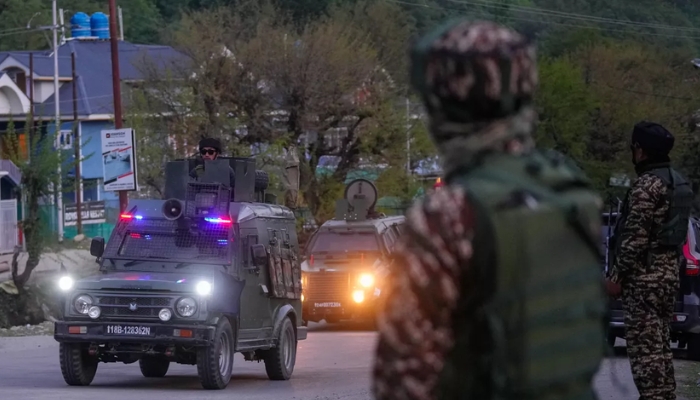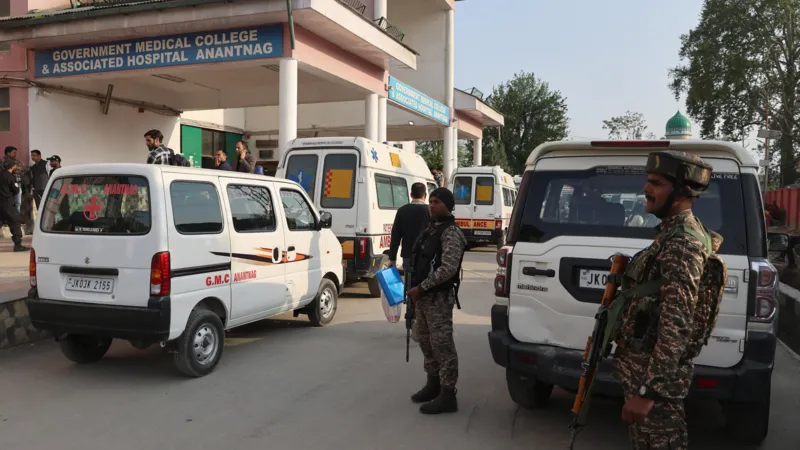Horror Unfolds in Kashmir as Armed Men Target Holidaymakers, Leaving Dozens Dead and Injured

Armed Attack in Kashmir: Scene of chaos and grief as over 20 tourists are killed in a deadly shooting by gunmen in Indian-controlled Kashmir.
Authorities have informed the BBC that gunmen opened fire on a group of local tourists at a well-known scenic location in Indian-administered Kashmir, resulting in the deaths of at least 24 people.
The incident occurred in Pahalgam, a scenic Himalayan town frequently referred to as the "Switzerland of India" for its stunning natural beauty.
The region’s Chief Minister, Omar Abdullah, described the assault as “far more severe than any civilian-targeted attack we’ve witnessed in recent times.” Reports indicate many people have been injured, with several in serious condition.
Global leaders including U.S. President Donald Trump, Russian President Vladimir Putin, and EU President Ursula von der Leyen strongly denounced the violence.
"Deeply troubling reports are emerging from Kashmir. The United States stands firmly with India in the fight against terrorism," said former U.S. President Donald Trump in a message posted on Truth Social.
European Commission President Ursula von der Leyen described the deaths as a “heinous act of terror,” while Russian President Vladimir Putin extended his “heartfelt sympathies,” calling it a “savage attack.”
Indian Prime Minister Narendra Modi, who cut short his official visit to Saudi Arabia following the tragedy, vowed that those responsible would “face justice.”
“Our determination to eliminate terrorism remains firm and will only grow stronger,” he declared in a statement on X.

Tuesday's assault marks a rare event, as tourists have seldom been targets throughout the region’s 35-year conflict, especially not on this scale.
India’s Home Minister Amit Shah flew to Srinagar, Kashmir’s main city, on Tuesday to lead an urgent security review.
Lieutenant Governor Manoj Sinha confirmed that both military and police forces were dispatched to the location.
So far, no militant group has claimed responsibility. The region, predominantly Muslim, has witnessed an armed rebellion since 1989, though violence has notably declined in recent years.
The shooting occurred in Baisaran, a lush highland meadow roughly 5 kilometers from the town of Pahalgam.
Inspector General of Jammu and Kashmir Police, Vidi Kumar Birdi, told BBC Hindi that vehicles cannot access the isolated site of the attack.
A survivor from Gujarat recounted the terror, saying panic spread quickly as the gunfire began, and people ran, screamed, and cried in confusion and fear.
Videos circulated by Indian media show armed forces rushing toward the site, while other clips reportedly capture wounded victims claiming the attackers specifically targeted non-Muslims.
Unverified footage on social media shows bodies strewn across a grassy field, with bystanders weeping and begging for assistance.
Police confirmed that several tourists with gunshot injuries were taken to hospital. The area has been sealed off, with roadblocks set up and vehicles being checked. A joint military-police operation is underway to locate those responsible.
Indian news outlets have reported that protests are scheduled for Wednesday in response to the massacre.
Since the early 1990s, Kashmir has been gripped by a violent separatist uprising against Indian rule, which has resulted in the deaths of tens of thousands, including both civilians and security personnel.
The Himalayan territory was split following India’s 1947 independence from British colonial rule and the subsequent partition that led to the creation of Pakistan.
Both India and Pakistan—nuclear powers—lay full claim to the region and have engaged in two full-scale wars and several skirmishes over its control since then.
India maintains a constant military presence in the area, with approximately 500,000 troops stationed there year-round.
The Indian government asserts that the security environment has improved and overall violence has decreased since Prime Minister Narendra Modi's administration revoked Jammu and Kashmir’s special constitutional status in 2019. Nevertheless, sporadic attacks continue to occur.
The last significant assault on civilians happened in June 2024, when militants fired on a bus carrying Hindu pilgrims, killing nine and injuring 33.
In a major 2019 incident, a suicide bomber in the region killed at least 46 Indian troops, prompting retaliatory airstrikes by India on targets inside Pakistan.
Pahalgam, where the recent attack unfolded, is a well-known holiday destination favored by both domestic and international travelers. In an effort to boost the local economy, the Indian government has been actively promoting tourism to the region in recent years.
Official data shows that Kashmir attracted approximately 3.5 million tourists in 2024.
Comments